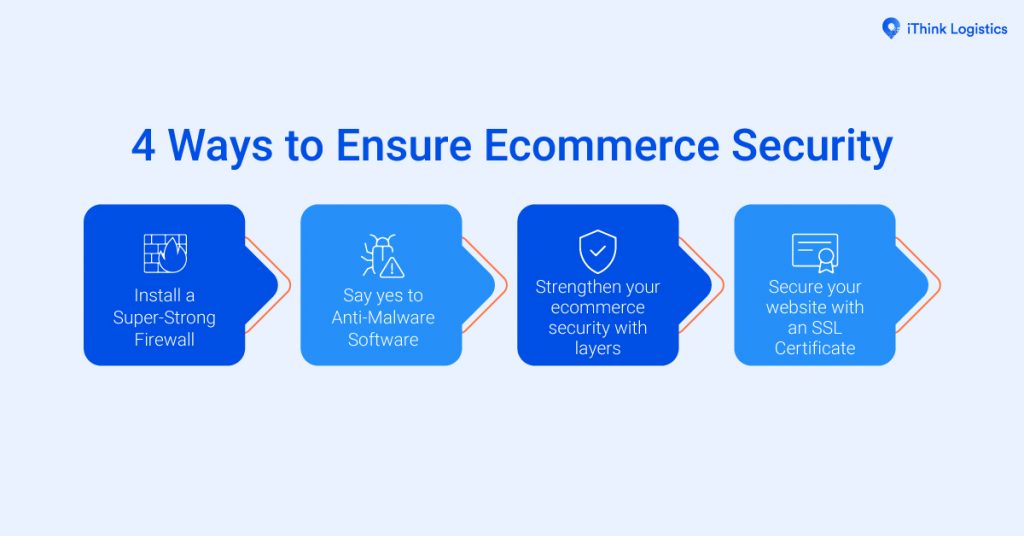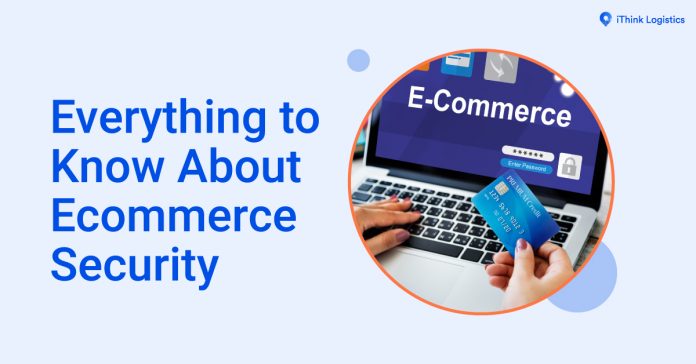Where there’s money, there are two kinds of people – businessmen and…thieves.
Just like a brick and mortar store, criminals have found creative ways to attack e-commerce websites as well. And while cybercriminals have gained popularity, the internet has also come up with better, stronger, and more secure ways to protect your business from their nasty hands.
But before we delve into how to keep hackers at bay, let’s learn the nuances of e-commerce security issues from the perspective of a buyer and seller.
4 Reasons You Need e-Commerce Security

Privacy of Data
One of the biggest reasons that people are worried about online payments is the fact that they have to give away their bank account details and phone numbers to the website. And more often than not, this data gets sold to third-party vendors who target them for various promotions, schemes, and even frauds. Even if the online retailer doesn’t sell this data exclusively, in the absence of proper encryption, firewall, and anti-virus software, hackers can easily access user data.
Trust
Customers already face hesitation when they have to pay before for a product and wait for a few days for the delivery to arrive. Add to that the stress of declaring their credit card and bank details can often be a dealbreaker. Customer has to feel secure that their data is secure and will remain unchanged. Customer has to be assured that their data will not be altered in any way for any malicious use.
Authentication
A big challenge for e-commerce sellers and shoppers is knowing that they are transacting with an actual/real business/person and getting genuine items/services. Since e-commerce websites lack human interaction, customers may not feel safe by simply trusting a bot/website. Similarly, even e-commerce websites need to know that they are not being fooled. One way to authenticate the user is by asking them to register and log in. Since a login requires an email id, it becomes easier to identify and authenticate them. A great way to ensure security and authentication of transactions is by asking the customer to enter their credit card PIN number and an immediate auto-generated password.
Confirmation
A simpler term for non-repudiation. A principle that e-commerce website owners follow as a thumb rule is to establish trust behind the buyer’s decision to purchase. The business and the buyer, both parties shouldn’t backtrack on the transaction, which is why it has to be confirmed. In order to do so, after every purchase, a message, mail, and now even a Whatsapp message is sent to the buyer along with a detailed invoice for proof of transaction.
Now that we have some idea about why one needs to ensure ecommerce security, let’s take a look at some of the ways you can do so.
4 Ways to Ensure Ecommerce Security

Install a super-strong Firewall
A firewall is essentially a filter. Just like a water filter lets pure water droplets pass and keeps impurities away, similarly, a firewall identifies genuine traffic from bad traffic like Spam, malware, XXS, etc. and blocks fraudsters/hackers from accessing your website and user data.
Say yes to Anti-Malware Software
It’s not the internet from where many viruses and malware can hack into your account/website. It is also the electronic devices that we use. It is important to install antivirus software to detect all easily detectable as well hidden malware from the system. This software regularly scans the entire system to ensure complete safety. While e-commerce security issues cannot be solely handled by anti-malware software, it is definitely a good start.
Strengthen your ecommerce security with layers
Just like adding more locks and double doors to your entrance, you also need multiple layers to keep malicious and fraudulent individuals away. More often than not, their people try to access user data with their username and password (often obtained illegally). By adding two-step authentication that asks users to enter a code they received via email/SMS, wrongful users can be identified and blocked. Also, consider installing a Content Delivery Network to block unwanted and corrupt traffic.
Secure your website with an SSL Certificate
While the internet makes it possible for an ecommerce business owner and a buyer to transact with each other even from miles away, it also runs the risk of the user’s private information reaching the wrong hands. Since the internet is operated via servers, user data bounces off multiple servers before reaching the destination of the intended person. In order to ensure that no data gets leaked while reaching this destination, you need an SSL Certificate – Secure Server Layer. A safe and secure way to encrypt sensitive user data.
Conclusion
Humans evolved from locks to lockers. Similarly, it’s time we move on from simply being happy with a pre-installed anti-malware to fortifying our security with modern-day solutions. Because in an age where the internet is making work-from-home and shop-from-home possible, even hackers have evolved and found more and more complicated ways to breach our privacy. However, with the right security instalments on your e-commerce store, you can rest assured that the sensitive data of your users will always be safely encrypted.
And always remember, when a user feels safe, they will not hesitate to shop from you again. Gain trust, build confidence and become a reliable e-commerce business owner by securing your website today.








